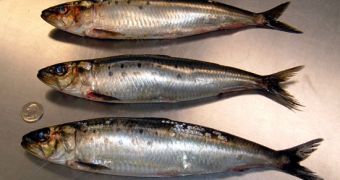This past Sunday, those in charge of overseeing sardine stocks in the Pacific Ocean agreed to implement stricter rules and regulations for this species.
Apparently, the Pacific Fishery Management Council has decided to set new catch levels for the sardine fisheries in the US West Coast Pacific after several studies have made it quite clear that, since the previous year and up until now, the overall sardine population has dropped by 33%.
Thus, several conservationists and even some marine biologists saw fit to draw attention to a so-called sardine collapse: fish is taken out of the ocean at much faster rates than the remaining population can breed and fill in the “voids.”
Still, green-oriented organization Oceana warns that, despite the fact that 2013 catch levels will be significantly lower than those in 2012, the Pacific Fishery Management Council has failed in taking into account the fact that Canada and Mexico are in fact increasing their catch rates.
Moreover, the newly established catch levels overlooked the fact that other animal species such as whales, seabirds, salmon and tuna rely on sardines as a major source of nutrients.
Geoff Shester, presently employed as the California program director for Oceana, made a case of how, “It is frankly unbelievable that the Council recognizes its current management is outdated and needs to be revised, yet year after year they continue to set quotas that are driving the population to collapse.”
Furthermore, “The current catch levels are set without considering how much needs to be left in the ocean to support a healthy food web, and without considering other recreationally and commercially important fish species that need to eat sardine to thrive. Ultimately, this hurts not only the sardine stock, but coastal communities and ocean wildlife.”
Presently, Oceana is asking that the Pacific Fishery Management Council revise its formula for establishing catch levels as soon as possible, otherwise the sardine population will continue to decline and ultimately negatively impact both on marine wildlife and on the fishing industry.

 14 DAY TRIAL //
14 DAY TRIAL //